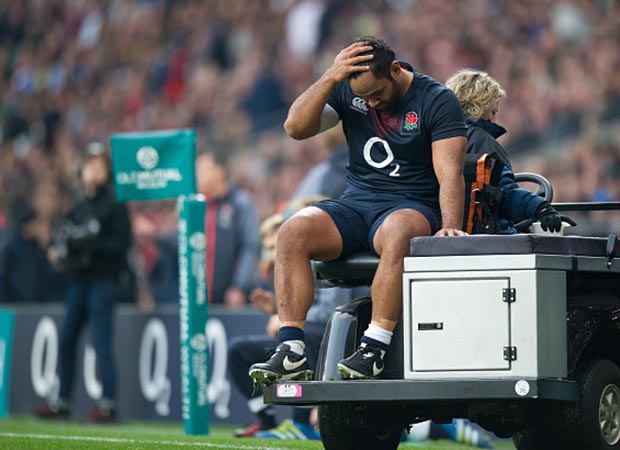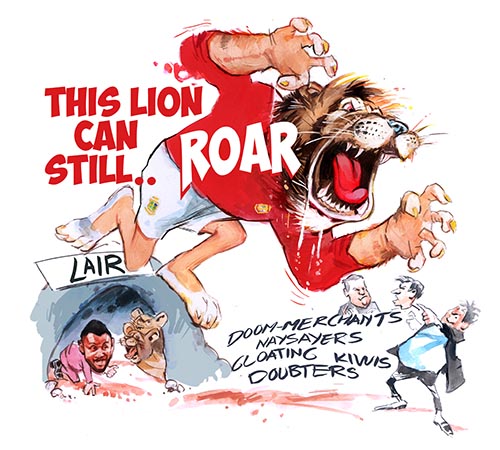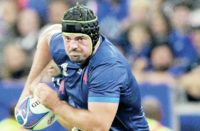 The wailing and gnashing of teeth over Billy Vunipola's withdrawal from the Lions tour party to New Zealand due to a shoulder injury has been way over the top. When the powerhouse No.8 made himself unavailable after requiring regular treatment during Saracens Premiership semi-final exit against Exeter at Sandy Park the doomsayers were out in force almost instantly.
The wailing and gnashing of teeth over Billy Vunipola's withdrawal from the Lions tour party to New Zealand due to a shoulder injury has been way over the top. When the powerhouse No.8 made himself unavailable after requiring regular treatment during Saracens Premiership semi-final exit against Exeter at Sandy Park the doomsayers were out in force almost instantly.
The talk was of a body blow to the Lions' hopes of winning the series against the All Blacks even before they had left these shores, such was the magnitude of their loss. Big Billy had been cast as the ‘Indispensable One', on whose ball-carrying foundations and mighty physicality the hopes of Warren Gatland's squad rested.
That the Saracens and England No.8 has developed into a world-class player with tremendous gain-line power is not in question. However, attempts to dress him up as a one-man-army without whom the Lions are scuppered is defeatist claptrap.
The last time I looked Rugby Union was still a team game in which the sum of the parts are invariably greater than the attributes of the individual. It is what gives our sport its strength, and it is why unfancied teams with unshakeable collective strength often prevail over the star-studded variety.
It is what underpins the remarkable achievements of New Zealand as a rugby nation. Although they have their fair share of brilliant players it is their exceptional team ethic that explains the success of the All Blacks – and it is also what separates the great Lions successes in 1971, 1974, 1989, 1997 and 2013 from their less illustrious tours.
Vunipola's decision to make a clean break and announce immediately that he was unavailable to tour was praised as being gutsy by England coach Eddie Jones, and he certainly did the Lions a favour by being so decisive with such a difficult decision.
It is clear that there was a body of opinion – including Lions coach Gatland – that Vunipola's shoulder injury was one that might be nursed and ‘managed' through the tour, and then attended to afterwards. However, the Saracens No.8 took the view that he was not fit to play, and that in the best interests of his future career he should have the surgery required to repair a deteriorating shoulder problem now rather than later.
In the process Vunipola nipped in the bud the corrosive speculation about the fitness of key players that is a regular accompaniment to Lions tours. Vunipola certainly deserves praise for recognising that if he went to New Zealand carrying an injury he could turn into more of a handicap than a strength, with speculation about his fitness to play a constant distraction.
What we also know for certain is that New Zealand coach Steve Hansen would have had a plan in place to nullify Vunipola's effectiveness. It is a highly effective All Black tradition to target their opponents perceived strengths so ruthlessly that they are undermined, thereby establishing psychological supremacy from the outset.
Keeping Billy Vunipola quiet for an entire series would take some doing, but even if the New Zealand strategy to stop him getting his usual traction was 50 per cent effective the sense that such a talisman was not making his usual impact would hit the opposition where it hurts most. Their self-belief.
 Vunipola's absence means that the 2017 Lions have had an early lesson in how they are going to have to adapt and improvise, finding ways to knock New Zealand onto the back foot throughout the tour irrespective of the hardships they face. This is what the 1997 Lions did in South Africa, when having lost Scott Quinnell through injury – a No.8 considered then to be as important as Vunipola is today — they found a bone-rattling replacement in Tim Rodber.
Vunipola's absence means that the 2017 Lions have had an early lesson in how they are going to have to adapt and improvise, finding ways to knock New Zealand onto the back foot throughout the tour irrespective of the hardships they face. This is what the 1997 Lions did in South Africa, when having lost Scott Quinnell through injury – a No.8 considered then to be as important as Vunipola is today — they found a bone-rattling replacement in Tim Rodber.
The Lions have to make sure that Hansen and his All Blacks, and the Super franchises they meet, are never comfortable that they have the Lions threats covered – and then unleash hell when it comes to the Test series.
There have been fulsome references to the overall strength of this Lions tour squad, meaning that they should remain a potent force despite the absence of Vunipola. My strong conviction is that the Lions have the ability to win this series, even without the England No.8.
The remaining back row resources are a handy case study. The Lions have two impressive openside flankers in Sam Warburton and Justin Tipuric. Warburton is at least the equal of his All Black counterpart Sam Cane, and Tipuric is a raider who can match Cane's rival, Ardie Savea, for pace and is a peerless link-man.
CJ Stander has shown over the last two seasons that, while not the biggest blindside, he punches way above his stature with his steaming charges round the fringes and excellent support play. Liam Squire has not yet had the same impact for New Zealand, and he and veteran Jerome Kaino are on the injured list.
Stander's fellow Irish back rowers Sean O'Brien and Peter O'Mahony make the Lions back row weave even richer. O'Brien is very strong over the ball, more a blindside than openside. However, he is one of the most damaging back row carriers in either hemisphere. O'Mahony is a highly effective line-out forward and a formidable scrapper at close-quarters.
The mobility and talent of No.8 contenders Taulupe Faletau and Ross Moriarty are examined in Jeremy Guscott's column (page 7). Both are capable of ensuring that Kieran Read is not the only No.8 in this series capable of acting as a carrier and play-maker, as comfortable out wide as he is in close.
Then there is late call-up of James Haskell. If he can rediscover his form for England in Australia last summer Haskell will be a big bonus, especially given his knowledge of the Kiwis following his stint with the Highlanders.
This helped Haskell to edge out Nathan Hughes, even though his Wasps team-mate is a No.8 who covered for Vunipola during his Six Nations absence. The fact Hughes did not make the initial tour party is a good illustration of the strength of this Lions squad, and why, great player that Big Billy is, his loss will not dictate the fate of Gatland's men. They will.


























